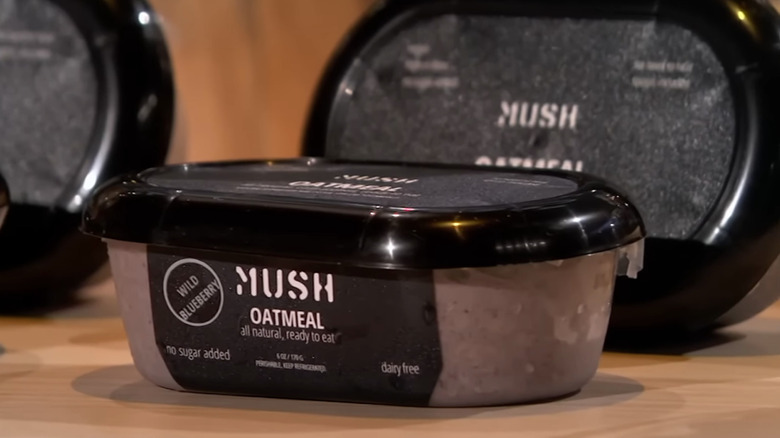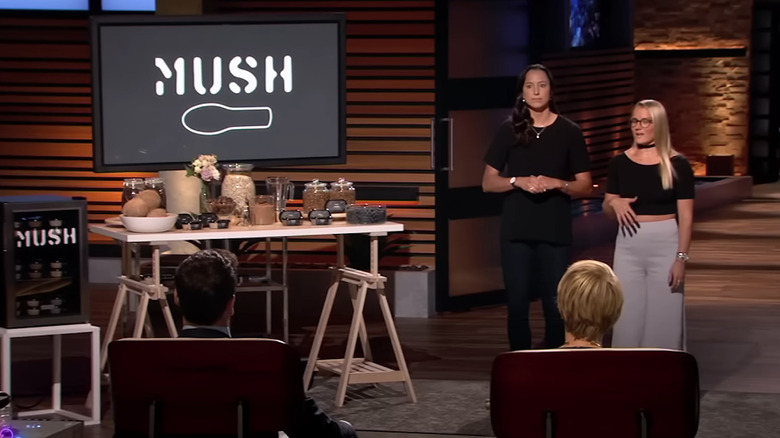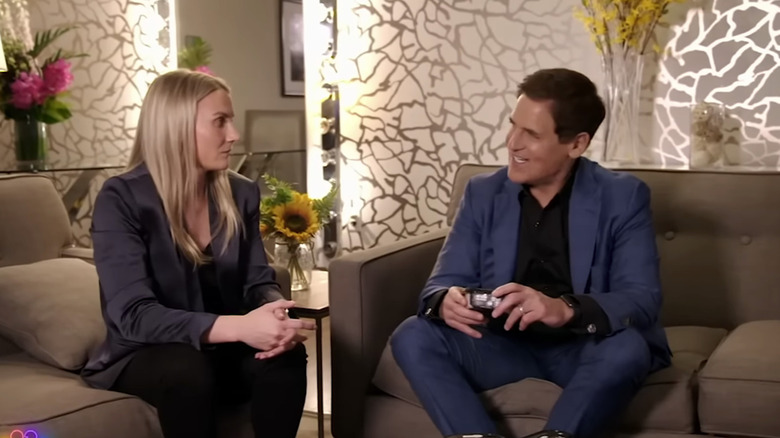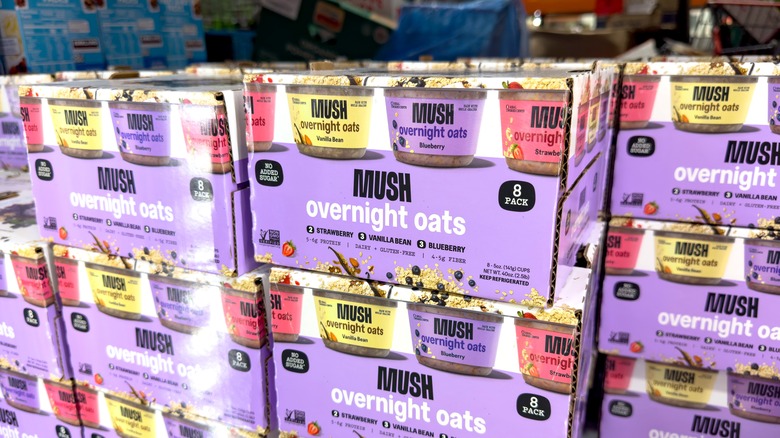Whatever Happened To MUSH From Shark Tank?
Americans regularly consume too much sugar. It's estimated that adult men consume 19 teaspoons of added sugar daily, while adult women eat 15 teaspoons-worth. These are two to three times the recommended daily sugar intake. Common sources of these added sugars include sweetened beverages, desserts, and sweet snacks; like cookies, ice cream, pies, and cakes. Knowing the population's sugar consumption problem, two friends, Ashley Thompson and Kat Thomas, set out to develop a healthy, on-the-go solution for noshers and regular eaters alike. They came up with a new type of overnight oats product called MUSH.
The concept started when both were still working in finance. As big oatmeal eaters themselves, they didn't have to look far to find the main ingredient of their product. Basically, MUSH is oats soaked in plant-based milk like coconut or almond milk. To enhance the flavor, they incorporate other real food ingredients such as apple, strawberry, cinnamon, and more. After quitting their jobs, Thompson and Thomas focused on their company and started selling MUSH at farmers' markets. In the first year, they made $72,000 in sales. In 2017, their second year in business, they sold $120,000. They were anticipating making $900,000 in sales the year after since they had already penetrated Whole Foods. But to ramp up production, they needed funding. So, in November 2017, the pair entered "Shark Tank" seeking $300,000 for 10% equity.
What happened to MUSH on Shark Tank
During their appearance on "Shark Tank" Season 9, Episode 12, Kat Thomas and Ashley Thompson presented their product as an alternative to high-sugar snacks such as yogurt, protein bars, and cereal. According to the co-founders, MUSH's edge over its rivals is that it's all-natural. It's not completely sugar-free, since many versions have sugar from the fruit which is added for flavor. But it is free from unhealthy, processed sugars. It's also a good source of fiber and protein. The Sharks seemed impressed after trying the samples and their sales were promising for a startup, especially since they were selling MUSH for $3.99 each while the average cost to make a unit was $0.70.
The negotiations started with Robert Herjavec bowing out simply because he didn't like the food business. Guest Shark Rohan Oza was the first to make an offer, $400,000 for 20%. Oza has a good track record in the food industry. He may have passed on the chance to invest in Luma Soda, but he is the mastermind behind Poppi and was responsible for the success of Pop Chips, Vita Coco, and Vitamin Water. Knowing MUSH would be in good hands, Lori Greiner opted not to make an offer. However, Mark Cuban challenged Oza's offer by offering what the pair had asked for, $300,000 for a 10% stake, plus an unlimited credit line. Barbara Corcoran offered the same thing, but in the end, the MUSH co-founders went with Cuban's offer.
MUSH after Shark Tank
Many companies and products experience the "Shark Tank" effect after appearing on the show. For instance, Heidi Ho's non-dairy cheese had a strong surge in sales after its episode aired. MUSH had a similar experience, with their entire stock wiping out quickly following their TV appearance. Mark Cuban even had to step in, helping secure a new supplier and establish a new production line so the company could replenish its stocks as needed. After Cuban and co-founders Kat Thomas and Ashley Thompson closed the deal, MUSH boosted its production by purchasing a used, automated manufacturing line. This significantly increased their capacity to 50,000 units per day — up from the previous 6,000-unit daily output.
In an update episode which aired in 2019, Thompson proudly shared that a year and a half after pitching on the show, they had already achieved $5 million in sales. This was mostly thanks to the substantial increase in market presence. From appearing in over a hundred retail stores before "Shark Tank," they expanded to over 3,500 shops nationwide, including Publix, Wegmans, ShopRite, and Walmart. Sadly, in the same episode, Thompson revealed that Thomas stepped down as COO due to health reasons; leaving her to man the business solo. Nevertheless, she was thankful that Cuban had been hands-on with guiding MUSH. The esteemed investor seemed pleased with the direction MUSH was headed as he quipped, "This is a rocket ship, and I'm glad to be part of it."
Is MUSH still in business?
While many products featured on "Shark Tank" went on to succeed, others became the biggest food flops in "Shark Tank" history. Thankfully, MUSH belongs to the former and not the latter, since the brand remains operational years after its co-founders took a chance on ABC's business-centric reality show. After a very promising turn of events post-"Shark Tank," the firm's funding ballooned to $23 million. In June 2021 alone, MUSH received a $5 million venture capital investment while en route to expanding its market presence. Today, the brand's overnight oats has seemingly become ubiquitous. The brand is now available at CVS, 7-11, Costco, Target, and Amazon. With such a structured and massive expansion, it doesn't come as a surprise that MUSH is already a multi-million dollar company.
Alongside the store expansions, MUSH diversified its product line to include protein bars and oatmeal smoothies. Its main offering remains the overnight oats, which now come in seven flavors: Apple Cinnamon, Vanilla Bean, Dark Chocolate, Blueberry, Strawberry, Maple Cinnamon, and Banana Bread. The company has also changed its packaging from rectangular tubs to cylindrical ones. Meanwhile, a partnership with Dot Foods has allowed the brand to make product placements in gyms, coffee shops, and on college campuses. Considering the scale of the brand's growth and marketing, it's clear that MUSH is here to stay for the long haul.



